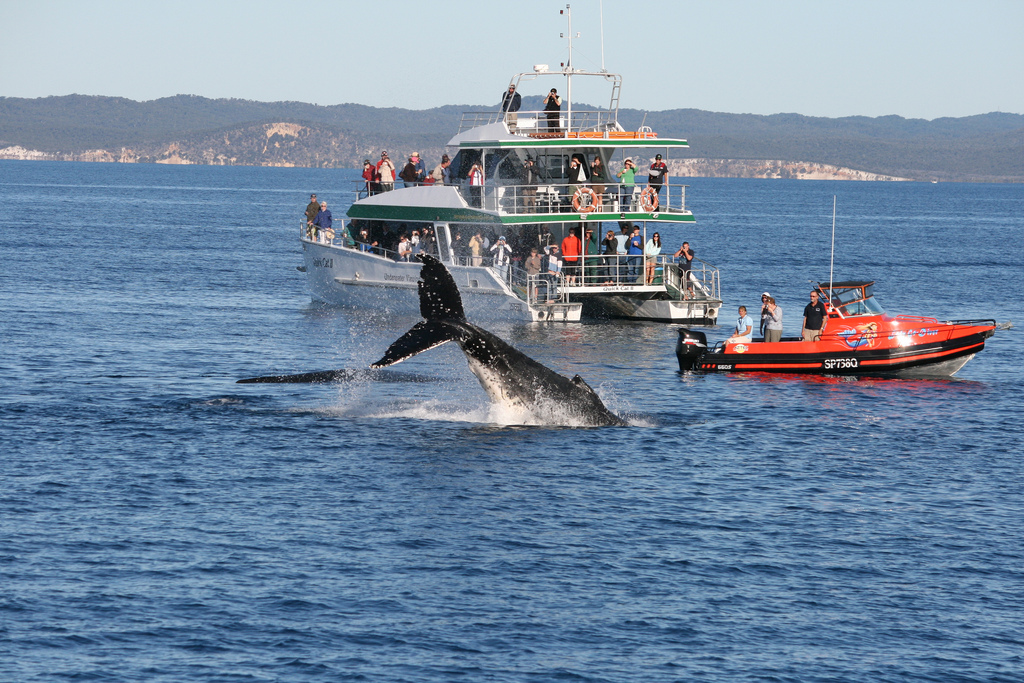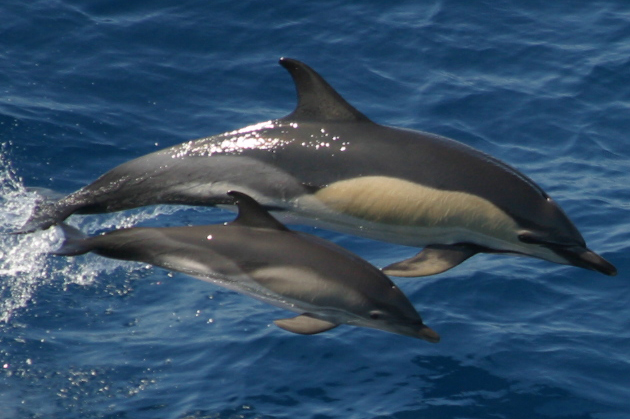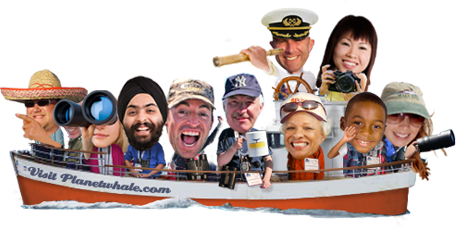Vision and Mission

Planet Whale is the global community that will change the way we view whales and dolphins forever. By harnessing the passion and ideas of individuals, we will achieve more to protect and defend our oceans than ever before.
Together we will:
· Give the people control so they can use it to help whales and dolphins.
· Inspire change through a new global partnership.
· Make whale watching more sustainable – and successful – than ever before!
· Reach out to the world with colossal festivals for whales and dolphins.
· Create innovative campaigns that harness the power of the web’s global community.
Global and local
Planet Whale is the global platform for everybody interested in whales and dolphins, bringing together enthusiastic groups of like-minded people from communities across the world.
Your community
 Planet Whale is a community. We don’t control Planet Whale – you do! Planet Whale is the framework by which you can organise everything whaley in your life - your reviews, news, encounters, photos, friends, and even your business or charity. Planet Whale’s mission is to provide a network that is accessible to the global community through simple organisation, accessibility and great content provision.
Planet Whale is a community. We don’t control Planet Whale – you do! Planet Whale is the framework by which you can organise everything whaley in your life - your reviews, news, encounters, photos, friends, and even your business or charity. Planet Whale’s mission is to provide a network that is accessible to the global community through simple organisation, accessibility and great content provision.
Tools for change
We all share a common principle - that Planet Whale brings us together as the most powerful positive force for whales, dolphins and the people that share their lives with them. As Google once eloquently put it: “Give the proper tools to a group of people who like to make a difference, and they will.”
Working together
Planet Whale is a virtuous circle. We believe that by linking people together we can seek solutions to the issues that face whale watching and whale and dolphin conservation, and we can also help businesses and charities to be more successful and consumers more satisfied. It’s a neat trick and we know how to pull it off! Planet Whale encourages the highest ethical standards, which can only be good for people’s livelihoods and the whales themselves.
Be positive
We do not dwell on problems. Instead we seek positive solutions. Planet Whale believes that many people are tired of hearing doom and gloom stories and feeling utterly helpless as a result. What’s the point of that when you can have a good time, get inspired by nature, then use Planet Whale to achieve something really positive for the environment! Together we will find out how.
At the heart of it all
 At the heart of Planet Whale is a belief that an encounter with a wild whale or dolphin reconnects us with the natural world in an amazing and powerful way. For one humbling moment we can be moved to tears or celebrating wildly as we stare through the thin veil of water that separates us from these magnificent animals.
At the heart of Planet Whale is a belief that an encounter with a wild whale or dolphin reconnects us with the natural world in an amazing and powerful way. For one humbling moment we can be moved to tears or celebrating wildly as we stare through the thin veil of water that separates us from these magnificent animals.
Planet Whale understands that we all need such encounters to reawaken our sense of responsibility to the natural world; energising ourselves to act for the greater good. That is our first step – only when we have been inspired will we feel compelled to act.
Whale watching is the practice of observing whales, dolphins and porpoises (otherwise known as cetaceans) in their natural habitat. Whale watching is a truly inspiring recreational activity capable of supporting scientific research, conservation efforts, and educational experiences.
The short answer is yes, but only if you travel with a high quality, sustainable operator. Planet Whale intends to help you find such operators easily by implementing a rating system that will lead you to the most sustainable operators when you search for trips. It’s coming soon, but in the meantime, here are five principles to sort the best from the rest:
- Operator follows a code of conduct for approaching whales and dolphins
- Professional (experienced) naturalist guide onboard
- Supports marine conservation or conducts scientific research
- Doesn’t guarantee spectacular encounters on every trip
- All staff sound friendly and knowledgeable when the booking is made
Many people think that whales and dolphins are only present off far-flung tropical islands or inaccessible polar seas. In fact, they are present in all of the world’s oceans and some of the biggest rivers. Trips now run from over 100 countries to watch many of the 81 species found worldwide. Planet Whale has the most comprehensive directory of trips online, so now you can easily find the nearest trips to you!
Some whales and dolphins remain faithful to a local area year-round, whilst others swim half way across the globe between their winter breeding and summer feeding grounds. Somewhere on the planet, somebody will be whale and dolphin watching every second of every day of the year, enabling you to go whale watching when it suits you.
To take a whale or dolphin watching trip could hardly be simpler through Planet Whale, where you can search by location, species, month or type of experience. Planet Whale is the best place to compare operators directly and read reviews from like-minded people.
Absolutely! Many of the best beach resorts around the world double up as important whale watch destinations, including in Hawaii, Queensland, California and the Canary Islands. Prefer a city break? You can still go whale watching, from Vancouver, Sydney, Hong Kong, San Francisco and many other great destinations!
Whale watching is unpredictable in many ways so putting time into planning your trip often pays off. Check with the operator to see whether you need to reserve tickets in advance. Some trips are very popular, particularly at weekends or during holidays, but if ticket reservation is not required, this gives you the flexibility to check on the weather before making a final decision. Don’t be afraid to phone up operators and ask them what they have been seeing over the last few days. Several operators based in the same location may have different itineraries and, consequently, could be encountering different animals.
Many people spend considerable resources on travel and accommodation in order to go whale watching and then only take one trip. Whilst this may satisfy the curiosity of some, it is unusual for a return trip to result in exactly the same type of encounters. Why not take two, three or even four trips out with the same operator on the same day, or over several days. Not only are you likely to see different animals, species and behaviours, but by building up a rapport with the crew you may gain a greater insight into the animals and the lives of those people who make a living from the sea. If you do decide to take several return trips, try to negotiate a discounted rate in return for your multiple booking.
All operators listed in the Planet Whale directory are encouraged to provide answers to the following questions. If they don’t, call or email them to double check:
- How much does the trip cost?
- How long does the trip last?
- What type and size of vessel do you use?
- Is the trip designed for whale watching, or is whale watching just part of the tour?
- When and from where do you depart?
- Is there a professional naturalist guide onboard? This is an important influence on the quality of your experience. A good guide will provide information on all of the wildlife of the area and how to identify them.
- Is the boat used for whale or dolphin research and do you contribute to the conservation of the animals that you watch?
- Do you follow a code of conduct for approaching whales and dolphins
- How often do you see whales and dolphins, which species and when?
- How many people do you carry per trip and are you confident that there will be enough reservations for the trip to run?
- Do you provide a free return ticket if no cetaceans are seen?
To avoid seasickness it is important to remain hydrated with a full stomach so take plenty of non-alcoholic drink and snack food with you. If you feel seasick, it can help to eat even if you don’t feel like it. Much of a whale watching trip may be spent travelling to and from key hotspots, so keeping your mind occupied can really help. You may wish to read a book, look for seabirds and other marine life or simply watch the sea in its ever-changing form. Whale watch operators will often ask for your help in searching for whales and dolphins. With perseverance you may well be the first to spot something!
Being cold, wet, and miserable can take the edge off a spectacular whale or dolphin encounter. Fortunately, such situations can largely be avoided by wearing the correct clothing and packing the right equipment for the trip. The most important considerations are the bare essentials: warm dry clothes, food and water. Even if it is a hot calm day on land, weather conditions at sea can be deceptively cool and changeable. Try to dress for all weathers. Take several layers of clothing, which will improve insulation in cold weather and give you several options if it is warm. Always think ahead. Once you have a chill it can be difficult to warm up even with extra layers of clothing so put warm clothes on as soon as you start to feel cold. A warm hat will prevent around 35% of your body heat being lost through your head. Windproof or waterproof clothing is essential. In sunny weather, a cap, sunglasses and sun cream are advisable for protection.


 Planet Whale is a community. We don’t control Planet Whale – you do! Planet Whale is the framework by which you can organise everything whaley in your life - your reviews, news, encounters, photos, friends, and even your business or charity. Planet Whale’s mission is to provide a network that is accessible to the global community through simple organisation, accessibility and great content provision.
Planet Whale is a community. We don’t control Planet Whale – you do! Planet Whale is the framework by which you can organise everything whaley in your life - your reviews, news, encounters, photos, friends, and even your business or charity. Planet Whale’s mission is to provide a network that is accessible to the global community through simple organisation, accessibility and great content provision. At the heart of Planet Whale is a belief that an encounter with a wild whale or dolphin reconnects us with the natural world in an amazing and powerful way. For one humbling moment we can be moved to tears or celebrating wildly as we stare through the thin veil of water that separates us from these magnificent animals.
At the heart of Planet Whale is a belief that an encounter with a wild whale or dolphin reconnects us with the natural world in an amazing and powerful way. For one humbling moment we can be moved to tears or celebrating wildly as we stare through the thin veil of water that separates us from these magnificent animals.

